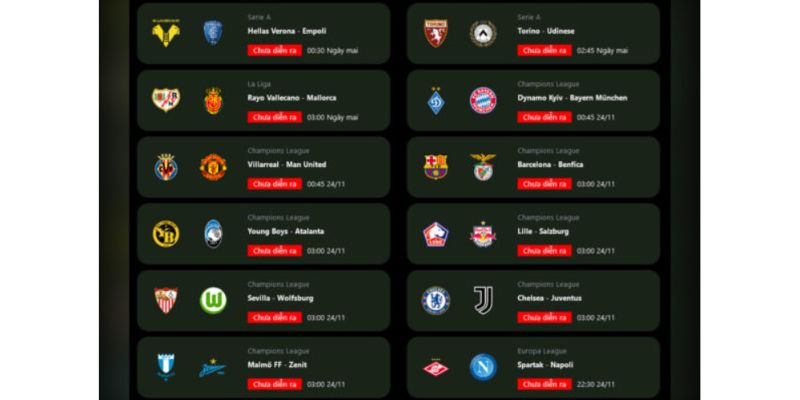Xem bóng đá trực tuyến xoilac, xem kết quả bóng đá world cup, bóng đá xôi lạc trực tiếp full HD
Bạn là người đam mê yêu bóng đá, bạn đang thắc mắc link vào xem bóng đá trực tuyến Xoilac, bóng đá xôi lạc trực tiếp là trang xem trực tiếp bóng đá tốc độ cao, bình luận viên bóng đá xem kết quả bóng đá world cup chuyên nghiệp nhiều giải đấu
Link xem bóng đá Xoilac cập nhật ngày 26-04-2024
Xoilac, là một trang web xem bóng đá trực tiếp những giải đấu bóng đá lớn nhỏ trong nước và ngoài nước. Bạn có thể xem, những trận đấu trực tiếp bóng đá với chất lượng cao tại kênh này. Ngoài ra, bạn cũng có thể dễ dàng tìm hiểu được nhiều thông tin hấp dẫn về bóng đá mỗi ngày. Xôi lạc, luôn tự tin là một địa chỉ chất lượng mang đến cho người xem những giải đấu hoàn toàn miễn phí.
Xoilac là gì?
Xoilac tv còn được gọi là trang web xem trực tiếp bóng đá chất lượng uy tín và được lựa chọn tại Việt Nam. Trang web này, cho người xem trực tiếp bóng đá miễn phí hoàn toàn mỗi ngày. Với trang web, xoilac trực tiếp người xem có thể dễ dàng xem những trận đấu bóng đá lớn trực tiếp trên thế giới và trong nước.

Xoilac, là một trong những trang web xem trực tiếp bóng đá miễn phí với chất lượng full HD. Người xem, có thể xem tất cả những trận đấu từ nhiều giải đấu trong nước và ngoài nước với chất lượng cao siêu mượt.
Nếu người xem, là một fan bóng đá chân chính thì xoilac này chính là nơi dành chỉ cho bạn. Người xem, đừng bỏ lỡ cơ hội xem trực tiếp bóng đá những trận đấu bóng đá hấp dẫn mà không cần phải tốn bất kỳ những chi phí nào. Với đội ngũ nhân viên bình luận viên chuyên nghiệp, kênh bóng đá xoilac luôn đảm bảo mang đến cho người xem những trải nghiệm tốt nhất.
Cùng với tên xoilac, người hâm mộ bóng đá có thể đến những trang web bóng đá trực tiếp khác như: xoilac tv, xoilac live,link,net…
Kênh bóng đá trực tiếp xoilac có những đặc biệt gì

Với kênh bóng đá xoilac này, luôn cung cấp cho người xem những trận đấu bóng đá đỉnh cao với chất lượng âm lượng tốt và hình ảnh rất sắc nét, tốc độ đường truyền mượt mà và ổn định. Trang web này, còn cung cấp cho người xem rất nhiều những đặc biệt nổi bật khác như là:
Xoilac bóng đá luôn cập nhập tin tức mỗi ngày
Tại trang web xoilac này, luôn có một đội ngũ bình luận viên chuyên nghiệp và giàu kinh nghiệm. Mỗi ngày, đội ngũ của trang web luôn cập nhập những tin tức về bóng đá mới nhất ở tất cả toàn bộ những giải đấu khác nhau từ trong nước cho đến giải đấu thế giới.
Từ đó, người chơi có thể nắm được tình hình về bóng đá như thế nào một cách dễ dàng. Tin tức mà xoilac cập nhập lên trang web cũng rất đa dạng, từ những tin tức về giải đấu, huấn luyện viên, cầu thủ hay chuyển nhượng về đội bóng.
Xôi lạc tv cập nhập kết quả bóng đá mỗi ngày tại trang web
Với những trận đấu bóng đá, được diễn ra sẽ được trang web này cập nhập đầy đủ kết quả của trận đấu. Giúp cho người xem, biết những kết quả trận đấu được diễn ra hôm qua hấp dẫn như thế nào. Khi bạn xem kết quả bóng đá trực tiếp tại xoilac, người xem cũng biết được nhiều thông tin khác nhau như: những cầu thủ được ghi bàn, tỷ số trận đấu, số lần phạt góc, số thẻ được rút ra, kiểm soát bóng của những đội bóng…

Xoilac cung cấp highlight chất lượng cao
Nếu như người xem, không thể nào xem được trực tiếp trận đấu mà mình yêu thích. Người xem, có thể vào trang web xoilac để xem lại những video được highlight được trang web này phát với chất lượng cao. Xoilac, luôn cập nhập những highlight tất cả toàn bộ các trận đấu hấp dẫn được diễn ra với nội dung đầy đủ.
Xoilac có lịch thi đấu cung cấp nhanh chóng và chính xác nhất
Khi bạn đăng nhập vào xoilac, người xem cũng sẽ biết được tất cả lịch thi đấu của những giải đấu bóng đá hiện nay. Chính vì vậy, mỗi ngày người xem có thể nắm được đầy đủ thông tin lịch thi đấu chuẩn bị sắp được diễn như: đội hình ra sân của 2 đội, ngày thi và thời gian tổ chức trận đấu hay tổ chức tại đâu.

Xoilac tv bóng đá luôn cập bảng xếp hạng cho người hâm mộ bóng đá theo dõi
Đến với xoilac, người xem cũng được cập nhập được bảng xếp hạng tất cả toàn bộ những giải bóng trong nước hay thế giới hàng đầu. Để được người xem, biết được thứ hạng của đội bóng. Trang web luôn cố gắng cập nhập một cách nhanh chóng để người xem dễ dàng biết được thành tích mà đội bóng mà mình yêu thích nhất.
Xôi lạc tv cập nhập tỷ lệ kèo trên trang web
Hiện nay, trang web xoilac cũng là một địa điểm soi kèo cược nhà cái của rất nhiều người chơi cá cược. Đến với trang web này, xoilac luôn cập nhập những kèo cược bóng đá cho tất cả những giải đấu. Thời gian cập nhập luôn luôn sớm, và thêm vào đó thông tin về bảng kèo cược cũng được đầy đủ giúp người xem có thể biết tất cả những thể loại kèo cược hiện nay.
Không chỉ dừng lại đó, xoilac còn chia sẻ cho người xem những kinh nghiệm soi kèo cược nhà cái chuẩn và chính xác nhất đến từ những chuyên gia có kinh nghiệm. Giúp người chơi, có thể tham khảo để có thể tăng tỷ lệ thắng cược khi cá cược vào những trận đấu bất kỳ nào.
Ngoài ra, trang web xoilac có một ứng dụng livescore, đây cũng là một ứng dụng khi người xem không thể xem trực tiếp bóng đá. Người xem có thể sử dụng ứng dụng này, để xem được tỷ số trực tiếp của trận đấu đang diễn ra. Giúp cho người xem, biết được về kết quả của trận đấu được diễn ra như thế nào một cách nhanh nhất.

Trang web xoilac có mục tiêu phát triển là gì

Với mục tiêu phát triển của trang web này, là trở thành một nơi xem bóng đá trực tiếp hàng đầu tại thị trường Việt Nam. Xoilac, còn mong muốn cung cấp cho những người hâm bộ bóng đá có một trải nghiệm xem bóng đá trực tiếp tốt nhất với chất lượng âm thanh sống động và chất lượng full HD sắc nét.
Ngoài ra, trang web này cũng mong muốn được mở rộng quảng bá cho những giải đấu bóng đấu. Từ những giải đấu bóng đá vô địch quốc gia, cho đến những giải đấu bóng đá quốc tế. Và từ đó, trở thành một trang web uy tín với nguồn thông tin chất lượng đến người hâm mộ bóng đá.
Xoilac, tự tin rằng với sự sáng tạo hiện đại tiên tiến trang web sẽ đạt được những mục tiêu này và trở thành một cầu nối giữa những người hâm mộ bóng đá với các trận đấu hay và hấp dẫn nhất.
Ngoài ra, xoilac còn có mục tiêu là muốn phục vụ tốt về nhu cầu xem bóng đá ở Việt Nam. Nhằm mang đến cho người xem, những trận đấu đỉnh cao với chất lượng cao mà không có một bất kỳ phụ thu nào. Đặc biệt, những trận đấu hấp dẫn đều được miễn phí hoàn toàn.
Mục tiêu của trang web này, luôn đặt trải nghiệm sử dụng của người xem lên hàng đầu. Chính vì vậy, khi truy cập vào trang web, người xem sẽ được nhận link xem bóng đá trực tiếp với trận đấu mà mình yêu thích một cách nhanh chóng. Bởi vì, hệ thống đường link xem bóng đá trực tiếp của trang web này ở tất cả những giải đấu như: Ngoại hạng Anh, Champions League, La Liga, Cúp C1, Cúp C2, World cup, Bundesliga, Copa America, Euro, và những giải đấu quốc gia…
Do đó, với những các link xem bóng đá do xoilac cung cấp. Người xem, cũng có thể xem những trận đấu bóng đá với hình ảnh và chất lượng với độ phân giải rất cao, đường truyền mượt mà, kích thước màn hình chuẩn và bình luận tiếng Việt lôi cuốn và hấp dẫn.
Trang web xoilac xem bóng đá trực tiếp miễn phí
Do đó, trang web được xem là một trang web phát triển cực kỳ mạnh và nhanh chóng. Bên cạnh đó, về cơ sở hạ tầng cũng được hệ thống áp dụng công nghệ mới nhất. Chính vì vậy, chỉ trong một thời gian rất ngắn trôi web này đã thu hút rất nhiều lượng người truy cập và người dùng rất lớn.
Xoilac, cũng cung cấp cho người xem những đường link xem những trận đấu hấp dẫn và luôn được cập nhập đầy đủ và nhanh chóng nhất. Ngoài ra, những trận đấu được phát sóng dưới dạng full HD đường truyền mượt mà. Với phương châm, đến từ trang web này “ ăn xoilac xem bóng đá”.
Xoilac, có một yếu tố quan trọng được xem một ưu điểm nổi bật nhất. Tự tin, cung cấp đường link bóng đá đường truyền ổn định và chất lượng nhất. Người xem, có thể hoàn toàn sử dụng được máy tính hay điện thoại để xem trực tiếp bóng đá trên trang web này.

Hiện nay, xoilac vẫn đang cố gắng không ngừng tiếp tục phát triển. Để phát triển trang web tốt hơn, cũng như nâng cao chất lượng hơn nữa của những trận đấu được phát sóng tại xoilac này. Có thể, giúp cho người xem có một trải nghiệm xem trực tiếp bóng đá tốt nhất khi xem trận đấu mà mình yêu thích. Và cũng mong muốn, đây là một nơi người hâm mộ bóng đá có thể xem bóng đá trực tiếp tốt nhất trên thị trường Việt Nam.
Xoilac phát bóng đá trực tuyến bóng đá hôm nay miễn phí 100%
Trang web này, có lưu trữ đầy đủ những trận đấu từ cơ bản đến những trận đấu chuyên nghiệp và được phát trực tiếp miễn phí hoàn toàn 100%. Người xem, có thể xem được tất cả những giải đấu bóng đá của Việt Nam hay cũng như những giải đấu bóng đá lớn nhỏ trên thế giới.

Xem bóng đá trực tuyến miễn phí tại xoilac như thế nào?

Để có thể, xem trực tiếp bóng đá trên trang web xoilac, người chơi chỉ cần thực hiện hướng dẫn đơn giản tại dưới đây:
-
Bước 1: Người chơi, truy cập vào trang web xoilac trên các thiết bị của mình như (máy tính, laptop hay điện thoại,…)
-
Bước 2: Lựa chọn trận đấu muốn bạn muốn xem tại xoilac.
-
Bước 3: Có thể bắt đầu, xem những trận đấu người xem muốn xem trên trang web xoilac.
Khi người xem, vào bất kỳ những đường link tại xoilac, người xem sẽ không phải trả thêm bất kỳ khoản phí nào. Bởi link của trang web này, cung cấp toàn bộ những đường link này miễn phí hoàn toàn cho người xem. Thêm vào đó, xoilac này còn cập nhập tới 3 đường link cho người xem thỏa sức được lựa chọn. Trang web xoilac, luôn cam kết tất cả những đường link xem bóng đá trực tiếp do xoilac cung cấp và không bao giờ dính mã độc hại đến người xem.
Xem trực tiếp bóng đá tại trang web xoilac cần lưu ý gì?
Việc đầu tiên, người xem cần đảm bảo kết nối cho mình ổn định. Điều này, rất quan trọng để có thể đảm bảo cho người xem có thể được truy cập vào trang web xoilac xem bóng đá không bị giật lag.
Với một trang web, xem bóng đá trực tiếp có số lượng người xem truy cập nhiều nhất. Chính vì vậy, một số người xem sẽ tình có tình trạng bị giật lag hay bị đơ về đường truyền mạng. Cách để khắc phục, khi gặp tình trạng này, chính là người xem sẽ sử dụng một đường link dự phòng mà trang web cung cấp hay server khác để có thể tiếp tục xem.

Nếu người xem, không tìm được một đường link dự phòng. Thì người xem, có thể liên hệ với nhân viên chăm sóc khách hàng của trang web xoilac để có thể được hỗ trợ. Đối với những trận đấu bình thường, người xem cần nên truy cập vào đường link trận đấu trước 10 phút. Đặc biệt, với những trận đấu lớn và hấp dẫn thì người xem cần nên truy cập sớm hơn 20 phút hay 30 phút để có thể kiểm tra được truyền có ổn định hay không.
Việc người xem, luôn cập nhật tin tức thường xuyên trên trang web bóng đá xoilac cũng sẽ mang đến cho người xem những tin tức, phân tích hay về bóng đá với những trận đấu và về những cầu thủ được quan tâm. Nếu bạn, là một người am hiểu về bóng đá người xem cũng có thể chia sẻ những phân tích về bóng đá của mình lên diễn đàn cộng đồng để xây dựng một cộng đồng của những người hâm mộ Việt Nam yêu bóng đá tại xoilac ngày càng được phát triển.
Kết luận
Với bài viết trên, chúng tôi đã chia sẻ những thông tin chi tiết nhất về trang web xoilac nhất. Trang web bóng đá này, là nơi xem bóng đá trực tiếp với tốc độ chất lượng cao nhất và bao phủ toàn diện xem miễn phí tại thị trường Việt Nam hiện nay. Tính đến thời điểm hiện tại, xôi lạc tv được người xem quan tâm nhiều nhất. Vì vậy, trang web này không ngừng nỗ lực để cải thiện và phát triển tốt hơn để đáp ứng được mọi nhu cầu của người hâm mộ bóng đá.





